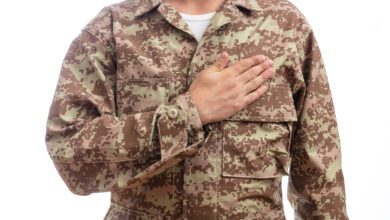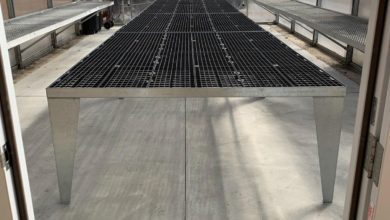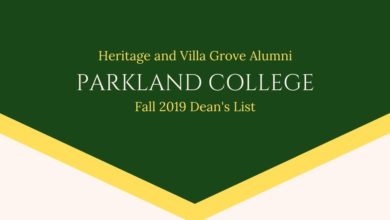SJ-O We the People team headed to Nationals

By FRED KRONER
The St. Joseph-Ogden High School students who are members of the We the People Constitution Team do not receive extra credit or even a grade for their participation.
The teen-agers receive something more, a thorough understanding of the government and the United States Constitution as well as how to discuss various aspects of each with adults.
While they learn, they are also excelling at a high level.
For the fifth consecutive year, SJ-O finished second in the recent (Jan. 15) state meet and qualified for the nationals for the fourth time.
The seniors have enjoyed the experience, which started with Zoom meetings last summer.
“I think it has made me overall more confident in learning about things such as politics and civics, and made me more interested in the topics,” Garren Meeker said.
The educational aspect has been eye-opening.
“It was interesting learning how everything fits together, but also how both the past and present have to be taken into consideration when looking at the way our government works,” Tyson Madsen said. “So much more of the original documents from the foundation of the constitution are applicable today than you’d expect, especially when you look at the concerns of the past and how they were addressed.
“You get to see what worked and what didn’t, and how that has affected us today.”
The structure of the state competition is that schools receive questions in the fall, allowing time to organize and prepare.
Each competing school enters six teams – one for each of the We the People curricular units – and each team consists of three to five students.
The six teams are provided two questions to research for the state finals, but only one question is ultimately asked.
The group creates a 4-minute group statement to share with judges followed by a 6-minute question-and-answer session. The scores of all six units are totaled to determine the final standings.
SJ-O was the runner-up to Maine South, which has won the state championship multiple times.
Though the questions are specific, the SJ-O students found that an overall mastery is important.
“When we first got started, I felt like there was a lot of information and that I wasn’t going to be able to remember half of it,” Alec Painter said. “Even though our topics are usually only related to one or two aspects of our government, being able to answer any question asked requires knowledge of basically everything else.
“It was somewhat overwhelming at first, but once you get into it, it becomes more fun and enjoyable.”
Meeker, Painter, Erin Patton and Mazie Ronk were members of the SJ-O unit which scored the highest at state.
Maintaining confidence was essential, Meeker said.
“Having the confidence in knowing what I am talking about, because there are some times where you can get tripped up, but then you remember this isn’t something that has to be super serious,” Meeker said. “You can have opinions and state them while still having fun.”
The question which the four-member group was tasked with answering was: What Rights Does the Bill of Rights Protect?
“The biggest challenge,” Patton said, “was what to incorporate in the statements, because whatever you talk about you get asked questions about.
“That means you have to be prepared to answer any questions related to what is in the statement. We had to be careful not to leave breadcrumbs in the statement to topics we aren’t prepared to answer questions about.”
Meeker found comprehension was essential.
“One of the biggest challenges is not only finding the right information, but getting to a point where you really know it,” Meeker said. “Mentioning something like a court case or a Federalist paper in your statement is cool, but if you don’t know exactly what you’re talking about it’s obvious.
“The amount of memorization can be stressful, but I definitely feel like we all remember more than we think. For example, during the state competition, my teammate brought up a piece of direct evidence flawlessly, and it wasn’t even something we had ever talked about. Something just clicked, and he knew what he was talking about.”

Aiden Livesay Brayden Wendt Rachel Wilson 
Gunnar Olson Evan Schmitz Nora Walden 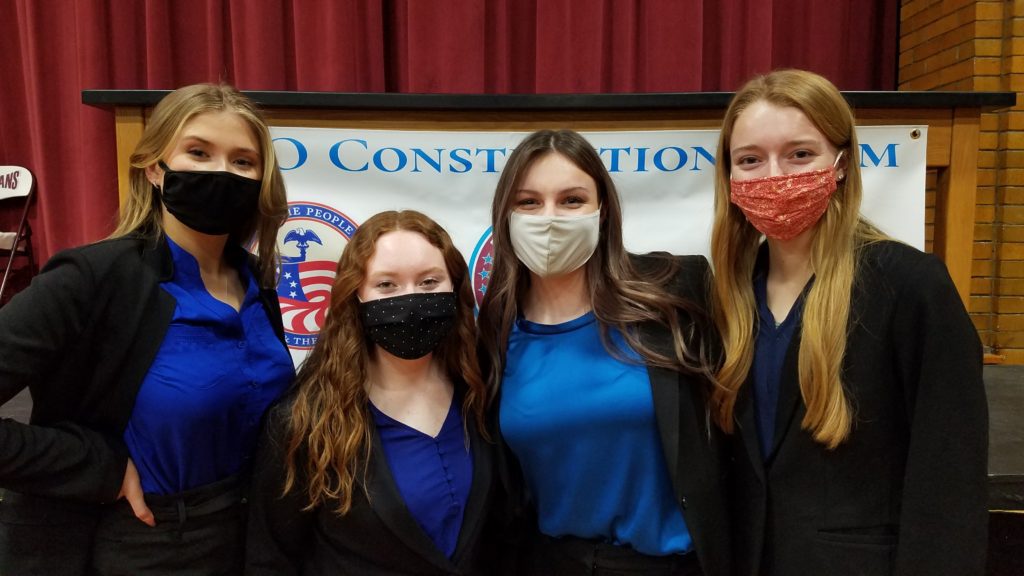
Emily Fisher Shelby Kofoot Sophia Martlage Indira Robinson 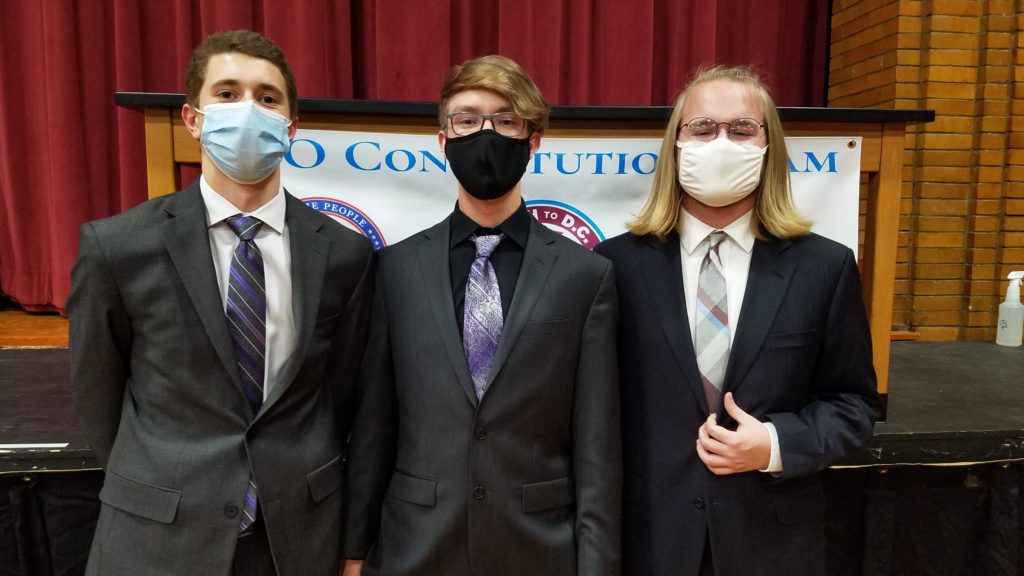
Dakota Franzen Tyson Madsen Brandon Mattsey 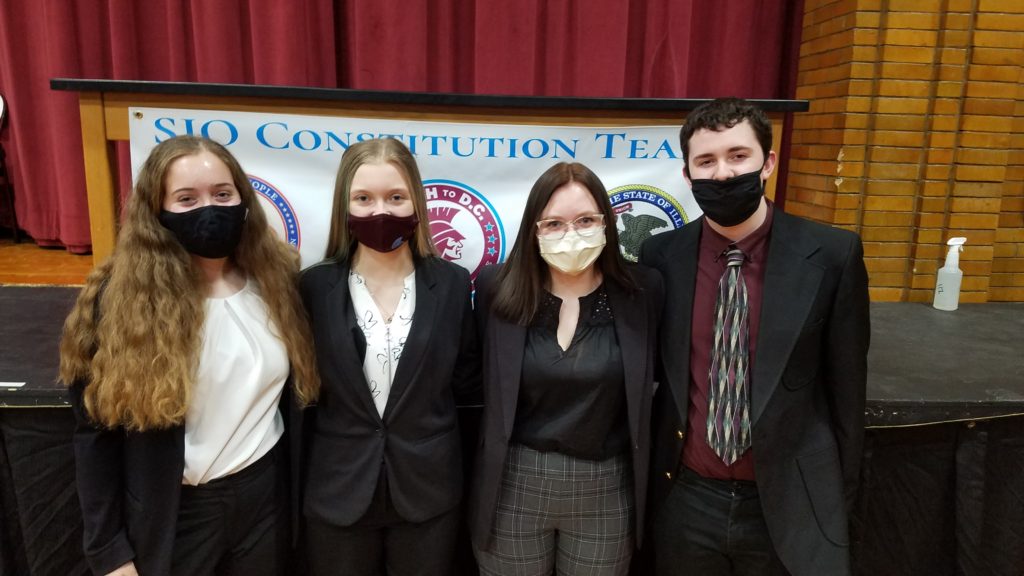
Garren Meeker Alec Painter Erin Patton Mazie Ronk 
Rylee Clements Kylie Duckett Mariska Harshbarger
Ronk was appreciative that the students were able to work together and didn’t have to go solo.
“I definitely value teamwork more than I ever have before,” Ronk said. “I am very grateful for my unit’s ability to work together flawlessly and help each other out when we needed it.
“We never let the bumps in the road steer us away from our goal.”
Painter said the students were able to appreciate – and respect – a variety of opinions expressed by their classmates.
“I have learned a few things about working with a team,” Painter said. “You might disagree on certain things, but in the end, you can still work well with them and work towards a common goal.
“It’s OK to have differences as long as they are approached respectfully and with team values in mind.”
Patton got involved with the We the People program by taking advanced civics.
“I expected it to be different,” Patton said. “I thought it was going to be just about the Constitution, but it is taking certain aspects of the Constitution and applying them to problems today.”
Madsen referred to the day of the competition as “stressful, but incredibly rewarding,” and approached it like a class discussion.
“Even though it feels like the judges are just going to rip you to shreds, that’s not what they want,” Madsen said.
“They want to have a conversation, and to see how well you know what you’re talking about.
“While watching every unit talk to their judges, you could tell when someone had a position or angle that they didn’t think about or didn’t expect to be brought up.
“Whenever I got stressed about talking to the judges, I just reminded myself that both the judges and my unit are interested in the same thing. If you just treat it like a nice conversation and show them what you know, you’re only limited by how much you understand the topic.”
By design, all 20 of the SJ-O students involved with the We the People Constitution Team were first-year members.
“You can only do this once,” sponsor Marshall Schacht said. “Each year we need to build again.
“We do have a tradition and employ some of the same teaching tools and techniques in our American History classrooms with the upcoming juniors.
“Not every junior wants to take on this challenge. It is part of the Advanced Civics curriculum and does help with the Advanced Placement Civics test.”
The state competition this year was held virtually instead of all competing schools descending on the Dirksen Federal Building, in Chicago.
SJ-O’s participants were all physically present at the same location, however.
“When we did state, we were all in the (school) auditorium watching every unit and trying to prepare, which I am really grateful for,” Meeker said. “I don’t think I would’ve been as confident if I had to be sitting at home on Zoom all day.
“It was nice to get to be with my unit and talk over things before we went.”
The 2021 nationals (scheduled for April 23-26) will also follow a similar virtual format, which means the students don’t need to raise money for a trip to Washington, D.C.
“The judges at nationals will be from around the country,” Schacht said. “University professors, state supreme court justices, legislators, and so on.
“The questions will be released next week and we look forward to getting started.”
Schacht implemented the program at SJ-O five years ago, but it has been in existence nationally since the early 1990s.
“We the People is a civics curriculum that was developed by the National Center for Civic Education over 30 years ago,” Schacht said.
Several of the students are involved in other activities at the school. Madsen is a drum major with the Marching Band and also part of the SJ-O theatre department.
Being a part of the We the People Constitution Team is equally rewarding.
“Being in the We the People team this year has changed the way I look at a lot of things, especially regarding how the things I learn can apply to my life,” Madsen said. “Learning about how our country works and the troubles it faces from both my own research and what I’ve learned from my peers has been a completely unique experience.
“I’ve really loved being able to dig into a specific issue and have to come up with solutions and evidence to back it up. I also love to listen to my friends talk about information they found from their units.
“Everyone has found some area of their unit that they are passionate about, so it’s amazing to listen to people talk about specific things they’ve found and how they’re going to talk about it. One of the best feelings is finding that perfect piece of evidence or thinking of that perfect point to bring up, and I love seeing other people experience that, too.”
The factual-based nature of the program keeps it from being politicized.
“Learning about the things that we’ve learned as a team is incredibly important regardless as to how active you are in politics,” Madsen said. “Being in We the People isn’t learning how to debate against someone else as a Democrat or as a Republican, it’s about understanding the foundations of our government, how they affect our daily life, and the problems that we face when trying to protect our way of life.”
The time devoted to studying and practicing was worthwhile in alleviating doubts.
“When I first read my unit’s questions, I had no idea how to properly answer it and was intimidated,” Madsen said. “However, the more we researched and talked, the more I was able to connect to the issues we had to face.
“I never thought I could be really passionate about the things my unit talked about, but the more we talked and researched, the more excited I got when we were able to come up with solutions and evidence.”
Painter expects the memories to stay with him.
“This experience was super cool,” he said. “I can’t even put into words how good it felt to present our paper that we have worked on for months.
“Even on the day before the competition, I was worried I didn’t know enough to do well, but after actually presenting, I realized just how much I have learned in the months leading up to this.”
Schacht and Don Beckett teach U.S. History to all juniors at SJ-O. They have served as spearleaders for the competitive We the People team.
In previous years at nationals, SJ-O finished 44th out of 56 teams in 2017, followed by consecutive 31st-place finishes in 54-team fields in 2018 and 2019.
“I think the biggest factor is our teachers,” Painter said. “Both Mr. Schacht and Mr. Beckett have had countless meetings with my group outside of school.
“They both gave a ton of time into this program and it really shows through both their enthusiasm and the enthusiasm of the students.”
Madsen seconded his classmate’s views.
“Mr. Schacht and Mr. Beckett helped each unit out a lot,” Madsen said. “We were able to do a lot of congressional hearings in class about a variety of topics, which made us familiar with the format of the competition and how to answer questions.
“They also read our statements to help us come up with more complex topics and introduce more evidence. Some of my favorite parts of being in We the People have been just sitting down with my unit and Mr. Schacht, and going through different topics and ideas to help us put together our argument.”
Ronk is glad that she got involved.
“Mr. Beckett is the entire reason I joined the We the People team,” Ronk said. “During my junior year, he was always encouraging me and a few of my classmates to join the team, and he’s the one that got us excited to compete.
“I expected that I would enjoy being a part of the constitution team, but I had no idea just how much fun I would have. Being up on the stage with my teammates, presenting the statement we had worked so hard on, and feeling the excitement of the room was absolutely astounding. I can’t wait to do it again at nationals.”
Schacht said there are plenty of other people who deserve credit for their contributions.
“To prepare for past competitions and for this one, we rehearsed with lawyers (Steve and Chad Beckett) and Judge Brett Olmstead,” he said. “More have helped in the past and we will again need their expertise this spring.”
The SJ-O students who competed at state, and the question they were presented with were:
— Aiden Livesay, Brayden Wendt, Rachel Wilson: What are the Philosophical and Historical Foundations of the American Political System?
— Gunnar Olson, Evan Schmitz, Nora Walden: How Did the Framers Create the Constitution?
— Emily Fisher, Shelby Kofoot, Sophia Martlage, Indira Robinson: How has the Constitution Been Changed to Further the Ideals Contained in the Declaration of Independence?
— Dakota Franzen, Tyson Madsen, Brandon Mattsey: How have the Values and Principles Embodied in the Constitution Shaped American Institutions and Practices?
— Garren Meeker, Alec Painter, Erin Patton, Mazie Ronk: What Rights Does the Bill of Rights Protect?
— Rylee Clements, Kylie Duckett, Mariska Harshbarger: What Challenges Might Face American Constitutional Democracy in the Twenty-First Century?
Schacht said he is proud of all of the SJ-O participants.
“I admire them and enjoy learning with them,” he said. “They exhibit the work ethic and civic virtues that our country needs right now.
“We are living in remarkable times. Each day sheds new light on Constitutional questions.”
When SJ-O started preparations for state, there were 21 students participating.
“We were missing one of our leaders, Nadirah Edwards, who died in an accident in December,” Schacht said. “That really hurt our team, but her spirit was with us as we discussed questions that she cared deeply about.”

